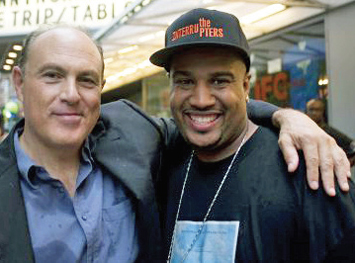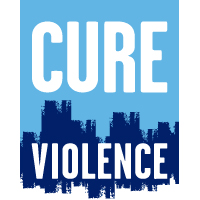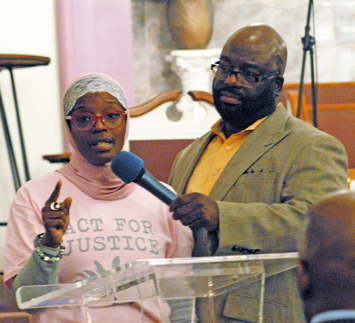Officials with Chicago anti-violence group named in sexual assault lawsuit
By Bryan Crawford -Contributing Writer- | Last updated: Nov 27, 2018 - 9:37:06 PMWhat's your opinion on this article?

Dr. Gary Slutkin (left) and Ricardo “Cobe” Williams of Cure Violence Photo: cureviolence.org
|
Ms. Bianca alleges she was harassed as many as three times, and in her complaint, stated she was ignored for years by both Dr. Gary Slutkin, head of Cure Violence, and officials at the University of Illinois-Chicago School of Public Health, which oversees and operates the organization. Dr. Slutkin and UIC are named as defendants in the lawsuit.

|
While Ms. Bianca worked inside of the Cure Violence office, two other women who did their work in the streets as violence interrupters, corroborated the allegations put forth. Lakisha McGowan and Ameenah Matthews—a well-known grassroots activist and conflict mediator. While not named as plaintiffs in the suit, they felt compelled to come forward and tell their stories as well.
Ms. McGowan—who is married—stated that while sitting in a vehicle with Mr. Williams, he touched himself and forcibly kissed her before she pushed him off. Despite being threatened with her job if she said anything, Ms. McGowan reported the incident and filed a complaint with UIC but was told to look past it because Mr. Williams was transitioning from a difficult life and lifestyle.
“As long as I kept my mouth shut, I knew my job was safe. It was my word against [Mr. Williams], who had so much power,” Ms. McGowan said during the Oct. 31 press conference.

Longtime Chicago activist Ameenah Matthews. Photo: Haroon Rajaee
|
“I had to think about saying anything for a long time because I knew that my family and people in the community would be affected. But it wasn’t hard for me to speak out once I decided to say something because I have a 17-year-old daughter, and it could be my daughter that he would force himself on, and she’s not strong enough to defend herself. So, it wasn’t difficult [to speak out]. Not at all,” Ms. Matthews said, while noting that at present, there are as many as nine women who have all come forward with their own allegations of abuse and mistreatment during their employment with Cure Violence.
UIC issued a statement that said in part, “The University and Cure Violence take all allegations of possible sexual misconduct in all of its forms very seriously. The University has received one charge of alleged misconduct related to Cure Violence that is already under investigation by the UIC Office for Access and Equity. The University has not been served with a federal lawsuit concerning Cure Violence. The University and Cure Violence cannot discuss specific personnel matters.”
Ironically, on the resource page of its website, Cure Violence offers several links related to workshops and studies dedicated to violence against women. According to Ms. Matthews, the problem at Cure Violence has become a cultural one, created at the top by Dr. Slutkin, who as an epidemiologist, has likened violence to a treatable disease. As head of Cure Violence, he oversees $6 million in annual funding from the State of Illinois.
“A lot of these violence prevention and anti-violence programs put in proposals with the state or federal government saying they have a solution that can help bring violence down by certain percentage points, compared to whatever the numbers were the year before,” Tio Hardiman, who worked under Dr. Slutkin, and alongside Mrs. Matthews at CeaseFire, told The Final Call.
“But when the violence doesn’t go down, they go back and say they didn’t have enough money to reach the goal they said they would, and they get more money. But the problem is, we’re not working with just numbers and percentages. These are real people who get injured and killed every day. And this is why I always say Black death is a continuous hustle.”
Mr. Hardiman suggested that Dr. Slutkin’s methodologies and ideas may no longer be practical or relevant in being able to address Chicago’s violence, and that his hands-off approach could be contributing to the issues currently affecting Cure Violence.
Nation of Islam Minister Louis Farrakhan, remarking on the rising up of women against their history of abuse and mistreatment by men, spoke about this very issue during his 2018 Saviours’ Day address, saying, “Women have not been treated right in any government on this Earth. … The enemy feels when he’s got a woman—I don’t care whether she’s White or Brown or Black—he feels, ‘If I am the boss, I have the right to abuse you.’”
He added, “And if you (women) don’t submit to that, you’ve just lost your job. We, as men, are not protectors of our women. And for that we will have to answer to God.”
INSIDE STORIES AND REVIEWS
-
-
About Harriett ... and the Negro Hollywood Road Show
By Rabiah Muhammad, Guest Columnist » Full Story -
Skepticism greets Jay-Z, NFL talk of inspiring change
By Bryan 18X Crawford and Richard B. Muhammad The Final Call Newspaper @TheFinalCall » Full Story -
The painful problem of Black girls and suicide
By Charlene Muhammad -National Correspondent- » Full Story -
Exploitation of Innocence - Report: Perceptions, policies hurting Black girls
By Charlene Muhammad -National Correspondent- » Full Story -
Big Ballin: Big ideas fuel a father’s Big Baller Brand and brash business sense
By Bryan Crawford -Contributing Writer- » Full Story






 Click Here Stay Connected!
Click Here Stay Connected!








